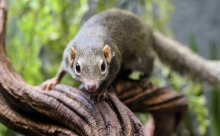Does evolution follow certain rules? Can these rules be predicted? Southeast Asia’s tree shrews break multiple rules when it comes to body size variation – with an unexpected twist – according to researchers from McGill University, University of Cambridge, and Yale University. The findings shed new light on the effects of climate change on the evolution of body size in animals.

Category:
Published on: 29 Nov 2022

By Melody Enguix
When scientists from McGill University learned that some fish were proliferating in rivers and ponds polluted by oil extraction in Southern Trinidad, it caught their attention. They thought they had found a rare example of a species able to adapt to crude oil pollution.
Published on: 26 Jan 2016

Insecticides that are sprayed in orchards and fields across North America may be more toxic to spiders than scientists previously believed.
Category:
Published on: 6 Aug 2015

Even jumping spiders have personalities scientists have discovered. A "shy" individual will not make the same choices as a "bold" individual. This means that some individuals, because of their personality type, will capture more prey than others, and will therefore have a larger effect on local ecosystems.
Category:
Published on: 6 Aug 2015
